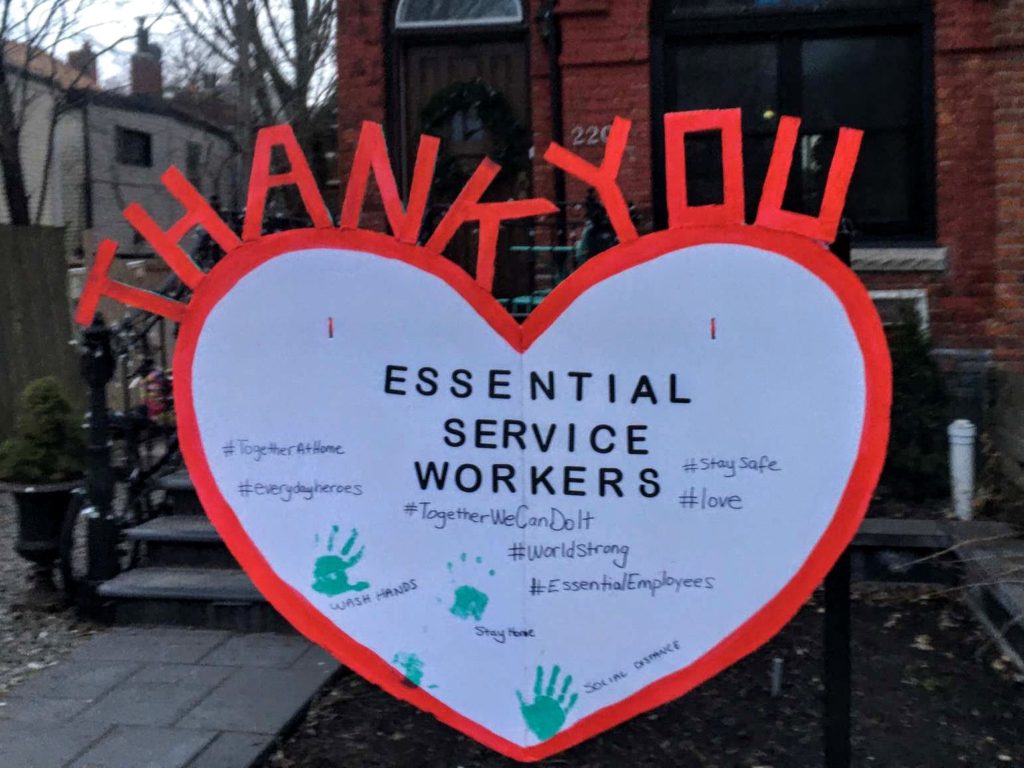
Colette Murphy is the Executive Director of the Atkinson Foundation.
I took this picture on a quick solo run through my neighbourhood a few days ago. Since the scope of the crisis became known, we’ve been moving at a lightning pace — powering through every emotion from surprise and excitement to anger and fear. But this sign slowed me down and helped me catch my breath.
It singled out the essential service workers for whom Atkinson is most concerned. The people who have been fighting for the dignity of a $15 hourly wage and paid sick days for years, and who are now described as “superheroes”. As the Workers’ Action Centre’s Deena Ladd said in an interview on the CBC’s The Sunday Edition about worker safety and protection, “They shouldn’t just be called superheroes because they’re doing what we need. They need us to stand up for them as well.” The makers of this sign did just that.
Their handprints and hashtags gave me some important messages about social solidarity to hold onto — similar to the small, silver stone engraved with the word “courage” Pat Capponi gave me many years ago. Pat embodied this word whenever she spoke with cabinet ministers and other civic leaders about the public issues at the core of her private troubles. Her powerful voice was silenced earlier this week by cancer. As much as we’ll miss her, this sign reassures me that other voices for justice will continue to speak out in high-touch and high-tech ways.
The sign was also a heartfelt expression of gratitude, something as essential as oxygen. In Atkinson’s work, this feeling is also a source of adrenaline. We’re grateful for the power and privilege to make a contribution to Canada’s COVID-19 response. We’re convening a group of experienced policy collaborators who are helping the federal government shape and improve access to its emergency income support measures. Atkinson Fellow on the Future of Workers Armine Yalnizyan is part of this effort. We’ve also made three rapid response grants so far to reach those who fall through holes in public and charitable safety nets.
This health and economic crisis has laid bare unconscionable inequality. It’s also an undeniable sign that a new social, economic and environmental contract is, in fact, possible. No one can say now that they don’t know who or what is essential. Essential to our health and security. Essential to our livelihoods. Essential to our democratic institutions. We all are. The economy must be rebuilt now with that fact in mind.
Pat Capponi put it this way in an op-ed more than a decade ago: “We know that beyond what may be personal responsibility for bad decisions and outcomes, there are systemic failures that are costing our society dearly in terms of talents lost, contributions left unmade, and dreams unfulfilled. The last decades have shown us that class divisions are so pronounced and entrenched, our lack of understanding and empathy so egregious, our systems so appallingly indifferent to the practical everyday needs of survival, that they are a huge part of the problem.”
What we know today is this: the old idea that only the fittest survive is an even bigger part of the problem. The planet simply won’t survive unless we are all fit. The time has come for everyone to muster a little courage and raise our voices to make it so.
